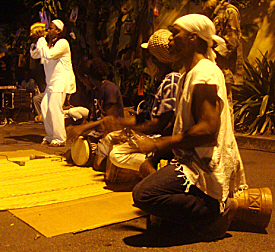
The gathering in the parking lot between the United Caribbean Association’s building and the Customs House marked the day in 1878 when St. Croix’s black population – freed for 30 years but living in conditions little better than slavery – had finally had enough.
On Oct. 1, 1878 – "contract day," the one day of the year when they supposedly could change the conditions of their employment – violence broke out and left one man dead, black Crucians took to the streets, burning most of Frederiksted and putting manor houses to the torch.
The uprising was finally halted by militia brought in to control the situation. The people perceived as the ringleaders were arrested and dragged to Denmark in chains, but as one speaker said, it brought about the end of the contract labor system and the end of subjugation in fact as well as name.
The story is such an important part of the island’s tradition that it was actually told three times Saturday before it was reenacted in a torchlight parade through Frederiksted.
As darkness fell over the Frederiksted waterfront area, chairs were arrayed in a semi-circle around an open area lit only by an overhead streetlight, casting the evening’s activities in amber light. Reggae music pulsed over the growing crowd, as grandmothers and their grandchildren tapped their feet, bobbed their heads and sang along with Bob Marley.
A drum circle and conch shell call gathered the people and focused their attention. Then an ancestral libation was poured to honor the spirits of community members gone before. In this instance, the names of Fireburn participants were called out and acknowledged.
The evening’s moderator, Sister Yulette, told the assemblage they could learn a lot from their ancestors. Economic issues from energy costs to joblessness are pulling people apart, she said, when more than ever they need to unite.
"We have to stay together," she said. "A united people cannot be divided."
The story was told the first time by Brother Iyahmi, a poet. His voice bristled with passion and energy, rising and falling as he told of the events that led to the burning of the town.
After a performance by dance company UCA Rebel Daughters, local historian Mario Moorhead took the microphone. HIs telling of the Fireburn story started 30 years before the event, in 18489, when slaves led my General Buddhoe marched on Fort Frederik and forced the governor to declare an end to slavery.
But the slaves were free in name only, he said. The following year, the Contract Labor Act of 1849 created a system so onerous that it lacked only the name slavery.
St. Croix’s black population began militating against the system in 1873, Moorhead said, but each year white overseers said they couldn’t do anything then, but "maybe next year."
In 1878, black Crucians decided that "next year" was here. In the ensuing violence, flames destroyed much of the island’s west end, and took the contract labor system along with it.
Moorhead was followed by a dramatic presentation, "1878: Queen Mary and Dem." Written by local poet and playwright Richard Schrader, it employed an 18-member cast to powerfully portray the events of Oct. 1, 1878.
Finally, after Schrader spoke briefly and the UCA Rebel Daughters gave one more performance, it was time for the passing of the fire torch. Then the assemblage stood and followed the torch bearers through Frederiksted.






